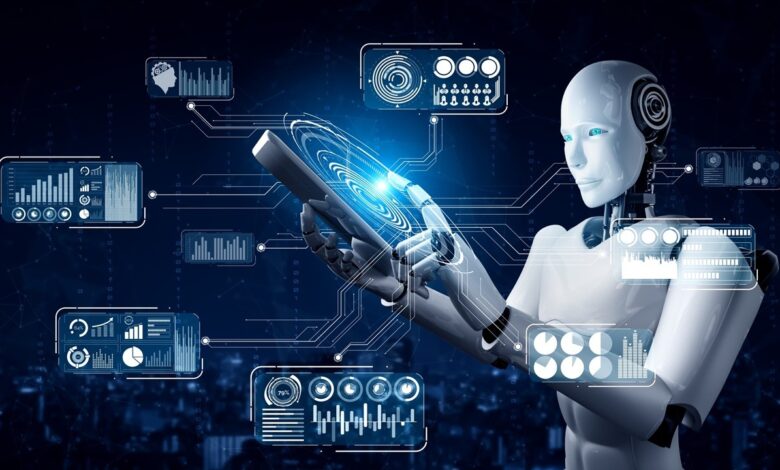The Future of AI in Everyday Life: Innovations that Will Shape Tomorrow

Artificial intelligence in 2025 is no longer the exclusive territory of the big players in technology and innovation businesses. Instead, it becomes the fabric of daily life, the way to work or the shop becoming smoother, changing how transportation, health, and the way one’s home works occur. Imagine a world in which your morning routine is automated, healthcare is proactive rather than reactive, and even your car drives itself to work—these are the future AI promises.
This blog digs deeper into how AI shapes our lives today and will in the years ahead. We review its potential to personalize experiences, enhance productivity, and revolutionize industries. Along with these advances, we review how aspiring professionals acquire the required expertise in data science, machine learning, and specialized certifications on AI that will eventually prepare a new workforce for the future.
AI in the Context of Everyday Life
AI alters how we live, work, and interact with the world. Siri, Alexa, Google Assistant, and streaming services like Netflix and Spotify that recommend certain content based on our viewing habits or listening history are part of the power of machine learning. All these things generally utilize AI to give suggestions about one’s past purchase history, browser history, or seasonal trends on online shopping platforms like Amazon and eBay. These are constituent parts of the lives of today’s human beings. As AI evolves, this is the starting point: it becomes smart, efficient, and autonomous. At the centre of these innovations lies the growth of data science and machine learning, which empowers AI to understand and fit in with people’s needs more and more.
Data Science and Machine Learning: The Backbone of AI
Data science and machine learning are the two cornerstones of AI in data analysis, pattern recognition, and decision-making. Machine learning is a form of AI that learns from data and improves itself over time without explicit programming. The more data AI systems process, the smarter and more accurate they become.
Data science is the backbone of AI. It combines statistical methods, computational tools, and domain expertise to unlock valuable insights from large datasets. With all this in mind, machine learning models now become even more accurate and help in developing models that predict trends, automate processes, and offer insights in real-time.
This is a good online course for individuals seeking to develop a career in AI by equipping them with skills to understand and apply such technologies. Preparing professionals for actual AI-driven work environments, certifications like the MIT AI Certificate provide an in-depth exploration of artificial intelligence, machine learning, and data science.
AI in Healthcare: A Revolution in Medicine
AI already sends shockwaves in healthcare by improving diagnostics, personalizing treatment, and accelerating drug discovery. AI algorithms analyze vast amounts of medical data for patterns. From the early stages of the detection of cancers to scanning through MRI scans, medical professionals provide better care through AI tools available today.
In 2025, AI will be used even more in healthcare. AI diagnostics are more advanced and provide real-time insights that enable personalized treatment plans. AI processes a patient’s medical history, genetic data, and lifestyle to predict potential health issues before they occur. This proactive approach leads to better health outcomes and reduced healthcare costs.
Furthermore, AI in drug discovery accelerates at its own pace. Machine learning algorithms predict how a compound will behave with others to speed up the process of discovering new medicines and treatments.
AI in Transportation: The Emergence of Autonomous Vehicles
AI is changing the face of the transportation industry. Self-driving cars, powered by machine learning and computer vision, are already undergoing tests, and in 2025, they will be a common scenario on our roads. These vehicles can process data received from sensors, cameras, and other devices to travel roads safely and efficiently.
Transportation beyond cars: AI is also applied to public transit systems to optimize routes and improve services. Autonomous buses and delivery trucks are already operating, making transportation safer, more efficient, and more sustainable.
AI also plays an important role in smart cities. With the application of AI, such cities monitor traffic patterns, optimize energy use, and update their infrastructure systems. By 2025, cities become much more thoughtful and connective, while AI systems will streamline everything from the lighting of roads to waste disposal.
AI in Entertainment: A Personalized Experience
AI has already changed the entertainment industry. Streaming services like Netflix and Spotify use AI algorithms to recommend content based on your viewing or listening habits. As AI advances, these recommendations become more accurate and personalized, providing a custom user experience.
In 2025, AI is at the heart of immersive entertainment. AI-driven video games build dynamic worlds that change according to the behavior of the player. NPCs become smarter and more interactive, thus enriching the experience of richer interaction and involvement.
Regarding VR and AR, AI participates in exponentially improving those technologies. Used together with AI, VR, and AR develop hyper-realistic surroundings that respond to a user’s activities, making the user experience more thrilling and immersive.
AI at Home: Smarter Living
AI is already an integral part of many smart homes, with the devices like thermostats, light bulbs, and security cameras becoming smarter daily. By 2025, AI will be deeply integrated into the home. Smart homes are adjusted to one’s preferences and anticipate one’s needs.
Evolved from simple voice commands to smart assistants, they learn about your habits and, in real-time, adjust the settings to achieve maximum comfort and efficiency. Be it the control of your thermostat, recommending meals according to your preference, or ensuring your home is secure, AI ensures that managing your home becomes seamless and personalized.
AI also helps facilitate personal productivity: virtual assistants provide support in appointments, task planning, and planning improvements in routine daily activities.
Role of Education and Training in AI Professional Careers
To the extent that AI increasingly touches life, the number of scientists and engineers who work in AI, machine learning, or data science has also increased. Any person who can keep ahead finds the right competencies.
Learning basic knowledge about understanding and working with AI technologies through online data science courses is amazing. Those willing to specialize can earn certifications as basic as the MIT AI Certificate and sometimes even a Gen AI Certification, where insight into artificial intelligence, machine learning, and deep and detailed data science knowledge is discussed, making professionals ready for a future of work in AI.
A PGDM in AI combines the technical expertise of AI with strategic insights to groom future leaders. Thus, these programs can help individuals obtain the knowledge they need to understand and apply AI technology in business to be valuable assets in AI-driven industries.
Ethical Considerations and Challenges of AI
While AI holds a lot of potential, it raises many ethical and societal questions. Data privacy, security, and AI bias must be addressed to ensure that AI technologies are used responsibly. The more autonomous AI systems become, the higher the risk of misuse or unintended consequences. In the next years, developing regulations and frameworks that govern the use of AI is essential to minimising potential harm.
The second challenge is job displacement. AI creates new roles but displaces jobs that rely on repetitive tasks. It calls for upskilling and reskilling the workforce so that people can remain competitive in an AI-driven economy.
Conclusion: The AI-Driven Future
In 2025, AI will be part of everyday life, transforming industries and creating new opportunities. From personalized healthcare to self-driving transportation and AI-based entertainment, the promise of AI is sunny and bright. For someone looking forward to thriving in an AI-driven world, acquiring expertise in data science, machine learning, and AI certifications is very important. Professionals prepare for this exciting and evolving AI landscape with online courses.
AI holds infinite possibilities. When we assimilate all these technologies, the world can be imagined to become smarter, better, and more connected. The future is now, and AI leads the way.





